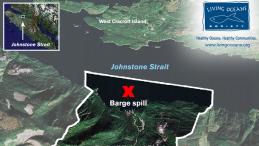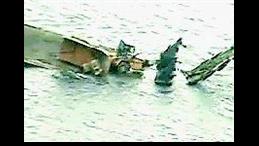Guilty verdict in Robson Bight oil spill
Will tax payers still be on the hook for $2.5 million?
SOINTULA, B.C. – Ted Leroy Trucking was found guilty yesterday on six pollution charges resulting from a 2007 accident where 11 pieces of heavy equipment carrying 20,000 litres of fuel slipped off the company’s barge into the waters of the Michael Biggs Ecological Reserve at Robson Bight, home to B.C.'s Northern Resident orcas.
Provincial Court Judge Brian Saunderson stated that Mr. Leroy, who offered no defence to the charges, was negligent or, “more likely, wilfully blind” to the condition of the barge. Sentencing is slated for May 3. The tug boat company and the tug’s skipper were not found liable in the incident.
“While this judgment sends a message to barge owners that they are legally responsible for ensuring the seaworthiness of their vessels, it remains to be seen who is financially responsible when it comes to cleaning up oil spills on our coast,“ said Oonagh O’Connor, Energy Campaign Manager for Living Oceans Society. “Despite the ruling, chances are LeRoy Trucking will never pay a dime because they declared bankruptcy shortly after the accident. That means the Canadian taxpayer will likely have to cover the $2.5 million cleanup cost.”
On May 19, 2009, a fuel truck loaded with 10,000 litres of diesel and a container filled with hydraulic oil that had slipped off the listing barge were successfully recovered. Of the 11 pieces of equipment on the seabed, these two were the most significant environmental threats to the Northern Resident orcas, salmon and seabirds that frequent the world renowned ecological reserve.
“In the wake of this judgment we have to ask, if it costs $2.5 million to recover less than 20,000 litres of diesel fuel, what would it cost to clean up a spill from a crude oil tanker similar to the ones Enbridge wants to introduce to B.C.’s North and Central Coast waters,” said O’Connor.
The Enbridge project calls for over 200 tankers per year to navigate through B.C.’s pristine Inside Passage, each carrying up to 2.3 million barrels of oil. A spill from one these vessels would devastate the ocean ecosystem and could be just as harmful to taxpayers.
Living Oceans Society is asking the federal government to permanently ban crude oil tankers from the Central and North Coast so that the ocean and coastal residents are not exposed to the risk of an oil spill of the same magnitude as the Exxon Valdez. Living Oceans Society is also asking for improvements to shipping regulations to ensure that accidents like the Robson Bight barge spill do not happen again.
Click here to see the video of the spill
-30-
Contactez-nous
Jennifer Lash, Executive Director, Living Oceans Society Ph:(604) 696-5044


